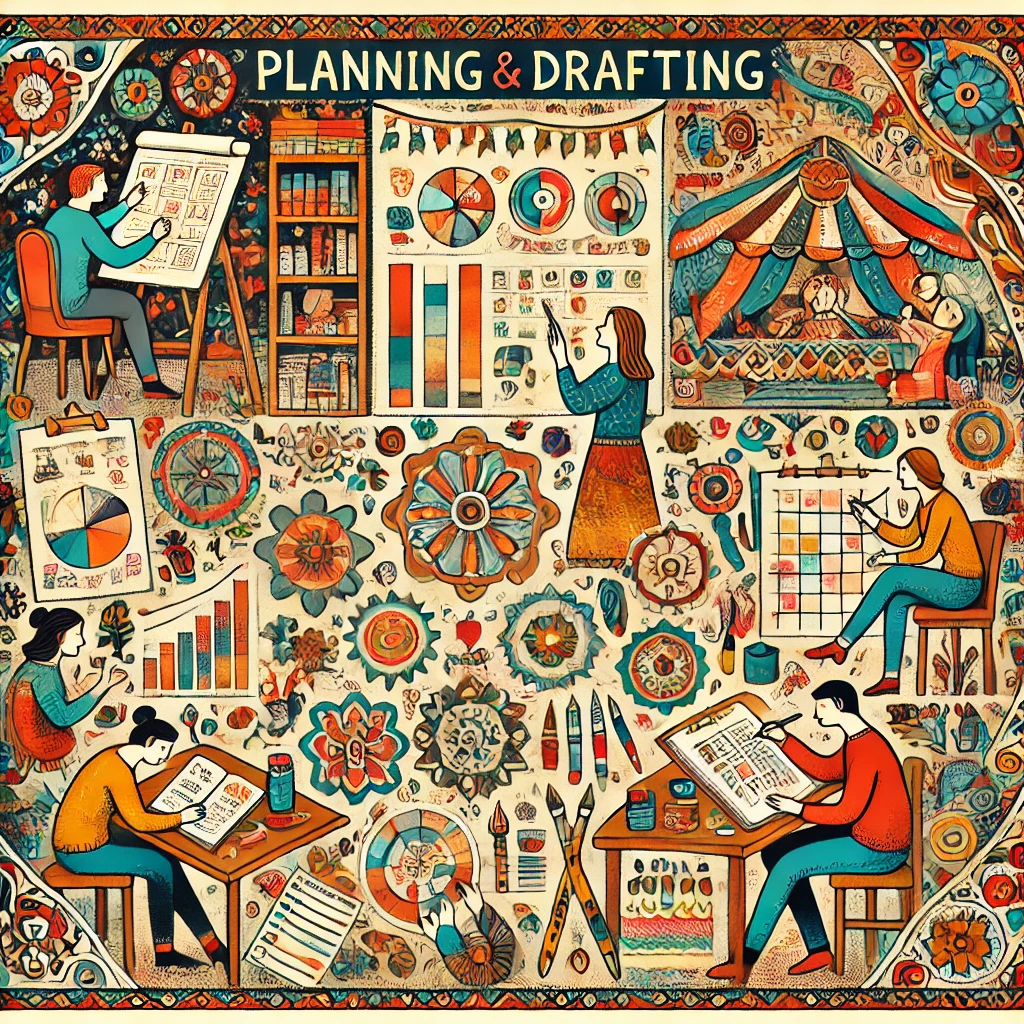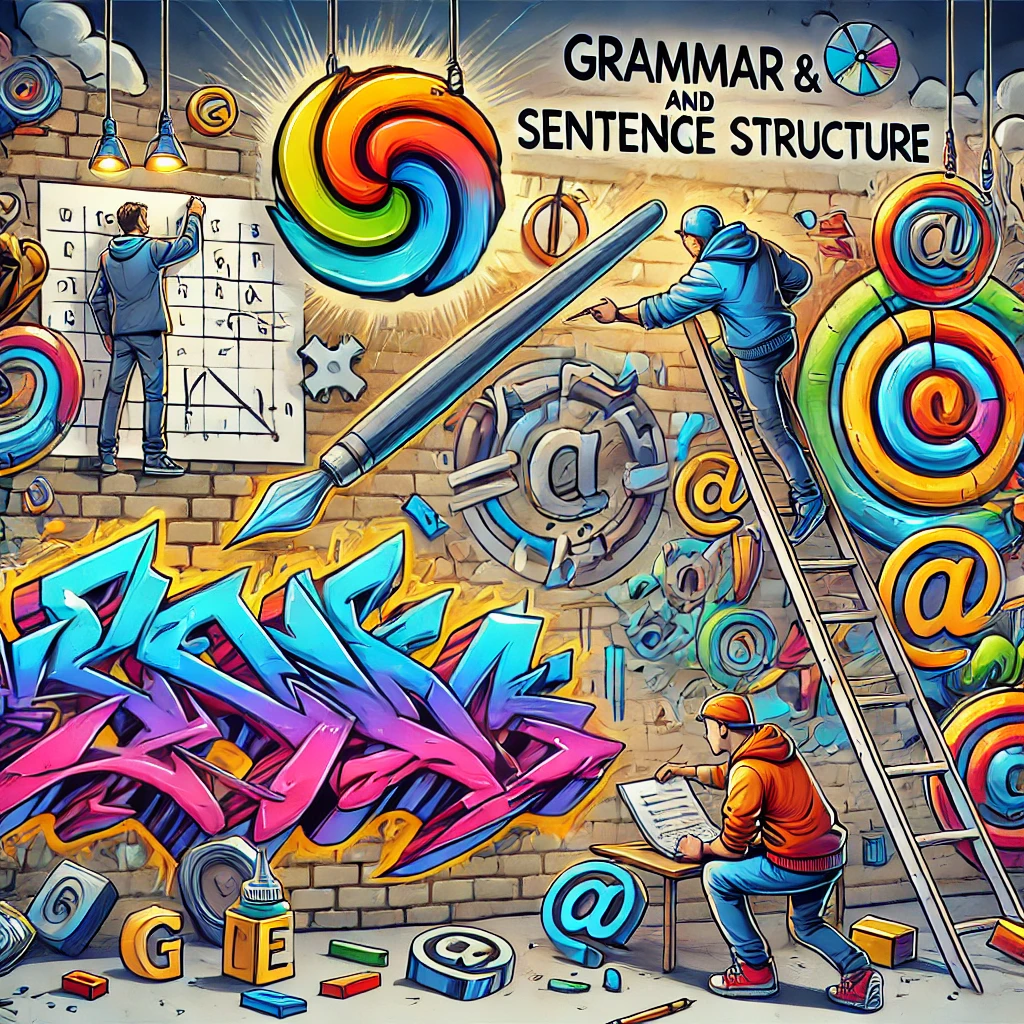
Learning goals
Understand Writing Techniques: Learn essential writing techniques and how to apply them in different contexts.
Improve Grammar and Structure: Enhance your grammar and sentence structure for clearer communication.
Develop Creative Writing: Foster creativity and originality in your writing.
Apply Real-World Writing Skills: Use writing skills in real-world applications and scenarios.
The Basics of Writing
Understand the Importance of Planning, Drafting, and Revising
Planning:
Importance: Planning is the first and most crucial step in the writing process. It helps you organize your thoughts, decide on the purpose of your writing, and outline the main points you want to cover.How to Plan: Start by brainstorming ideas and noting down key points. Create an outline to structure your writing logically. Decide on the main thesis or argument, and outline the introduction, body paragraphs, and conclusion.
Drafting:
Importance: Drafting is the process of getting your ideas down on paper. It is the first version of your writing where you focus on expanding your outline into full sentences and paragraphs.How to Draft: Write freely based on your outline without worrying too much about grammar or spelling. Focus on expressing your ideas and developing your argument. Don’t be afraid to let your thoughts flow, knowing that you will revise and refine your work later.
Revising:
Importance: Revising involves reviewing and improving your draft. It helps you refine your ideas, improve clarity, and enhance the overall quality of your writing.How to Revise: Read through your draft multiple times. Look for areas where your argument can be strengthened, ensure that your ideas flow logically, and check that each paragraph supports your thesis. Make necessary changes to improve clarity, coherence, and overall effectiveness.
Grammar and Structure: Focus on Correct Grammar Usage and Sentence Structure
Grammar Usage
Importance: Correct grammar is essential for clear and effective communication. It ensures that your writing is understood as intended and adds to your credibility as a writer.Key Grammar Points: Pay attention to verb tenses, subject-verb agreement, punctuation, and proper use of articles and prepositions. Use correct spelling and avoid common grammatical errors.
Sentence Structure
Importance: Good sentence structure contributes to the readability and flow of your writing. It helps to convey your ideas clearly and keeps the reader engaged.How to Structure Sentences: Use a variety of sentence types (simple, compound, complex) to add interest and avoid monotony. Ensure each sentence has a subject and a predicate. Combine short sentences to avoid choppiness and break up long sentences to avoid complexity.
Clarity and Coherence: Learn to Write Clearly and Coherently
Clarity
Importance: Clear writing helps your readers understand your message without confusion. It involves using precise language and avoiding ambiguity.How to Achieve Clarity: Use specific and concrete words rather than vague or abstract terms. Avoid jargon and overly complex vocabulary. Be direct and to the point, eliminating unnecessary words and phrases.
Coherence
Importance: Coherent writing ensures that your ideas flow logically from one to the next. It helps readers follow your argument and understand how your points are connected.How to Achieve Coherence: Use transition words and phrases to link ideas and paragraphs. Ensure each paragraph focuses on a single main idea that supports your thesis. Arrange your points in a logical order, whether chronological, spatial, or by importance.
Example Application

Planning:
- Brainstorm Ideas: Benefits of recycling, environmental impact, economic advantages, steps to recycle effectively.
- Outline:
- Introduction: Introduce the topic and state the thesis.
- Body Paragraphs:
- Paragraph 1: Environmental benefits of recycling.
- Paragraph 2: Economic advantages of recycling.
- Paragraph 3: Practical steps to start recycling.
- Conclusion: Summarize the main points and restate the thesis.
Drafting:
- Introduction: “Recycling is a crucial practice that benefits both the environment and the economy. By reusing materials, we reduce waste, save resources, and create a sustainable future. This essay explores the importance of recycling and provides practical steps to get started.”
- Body Paragraph 1: “Firstly, recycling helps to protect the environment. By reprocessing used materials, we reduce the need for new raw materials, thus conserving natural resources…”
- Body Paragraph 2: “Secondly, recycling has significant economic benefits. It creates jobs in the recycling and manufacturing industries, and saves money for consumers and businesses by reducing disposal costs…”
- Body Paragraph 3: “To start recycling, begin by separating your waste into recyclable and non-recyclable materials. Familiarize yourself with your local recycling program and follow the guidelines for sorting and cleaning recyclables…”
Revising:
- Check Clarity: Ensure each sentence clearly conveys its intended meaning.
- Improve Coherence: Add transition phrases like “In addition,” “Moreover,” and “As a result” to link ideas between paragraphs.
- Refine Grammar and Structure: Correct any grammatical errors and vary sentence structures to improve readability.
ACTIVITIES
Planning and Drafting (20 minutes)
Objective: Learn to plan and draft a piece of writing.
Instructions:
- Topic Selection: Choose a topic to write about.
- Planning: Outline your main ideas and organize them logically.
- Drafting: Write a first draft based on your outline.
- Peer Review: Exchange drafts with a classmate and provide feedback.

Grammar and Sentence Structure Exercise (20 minutes)
Objective: Improve grammar and sentence structure.
Instructions:
- Worksheet: Complete a worksheet with sentences that need grammar corrections.
- Group Discussion: Discuss the corrections with your group.
- Rewrite: Rewrite the sentences correctly and share with the class.

